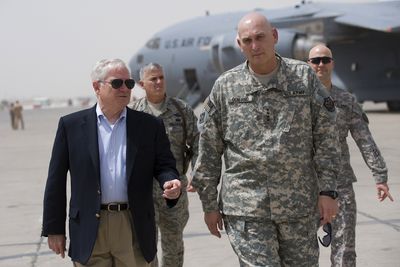Iraqi forces storm exile camp
Operation seen as act of independence from U.S.

BAGHDAD – Iraqi troops and police carried out a bloody raid Tuesday on the camp of an Iranian opposition group that the United States has long sheltered, marking the Iraqi government’s boldest move since it declared its sovereignty a month ago and offering the latest sign that American influence is waning as Iranian clout rises.
The operation, which caught U.S. officials off guard, coincided with a visit by Defense Secretary Robert Gates, and analysts said it appeared designed to send a message of Iraqi independence.
The Mujaheddin-e Khalq, or MEK, has supplied information about Iran’s nuclear program to the United States, but the group has long been an irritant to the Islamic republic, which has repeatedly asked the Iraqi government to expel MEK members. The way Baghdad deals with the group is widely seen as a bellwether of whether Iraq is more heavily swayed by Iran or by the United States.
Leaders of the group said Iraqi troops fatally shot four residents Tuesday night and wounded scores. U.S. officials have long opposed a violent takeover of the camp, and the Iraqi government’s willingness to carry out the raid while Gates was in the country startled some American officials.
Gen. Ray Odierno, the top U.S. commander in Iraq, said American officials did not oppose an assault on the camp as long as troops treated residents humanely. He said initial reports from Iraqi commanders indicated that their troops had not used lethal force and that no one had been killed.
“We didn’t know they were going to do this,” Odierno said Tuesday night. “We had no prior warning.”
Kenneth Katzman, a senior Iraq expert at Congressional Research Service, the research arm of Congress, called the raid “very serious” and said it was disturbing that it coincided with Gates’ visit.
“It suggests that as the Iraqi government is increasingly independent of the United States, it might use this freedom of action to ‘settle scores’ with its opponents or act on behalf of outside benefactors,” he said in an e-mail. “In this case, the attack would appear to be at the behest of Iran, which has accused (the MEK) of involvement in the recent internal unrest in Iraq.”
Residents of Camp Ashraf, home to more than 3,000 people, said in phone interviews that hundreds of Iraqi troops and police officers gathered outside the camp in the afternoon. Driving armored Humvees donated by the U.S. military, Iraqi troops in riot gear barreled through one of the camp’s gates and clashed with residents forming a human shield, according to residents.
The troops used batons, fire hoses, pepper spray, sound grenades and riot shields to plow through the hundreds-strong crowd, residents said. Group leaders said that at least 300 people were wounded in the clashes.
“They sprayed the residents with hot water and beat them with batons,” resident Safa Mohammed said in a phone interview. “They beat them with rocks. We tried to push them back, but, as you know, we don’t have any weapons.”
Their accounts could not be independently corroborated. Photographs and video clips that camp residents e-mailed to reporters showed troops beating residents. Other photos and videos showed bloodied men being stitched up at the camp’s clinic.
“This is a crime against humanity,” the group’s leader, Maryam Rajavi, said in a phone interview from Rome. “I’m really shocked. The American forces were present and allowed this attack to take place.”